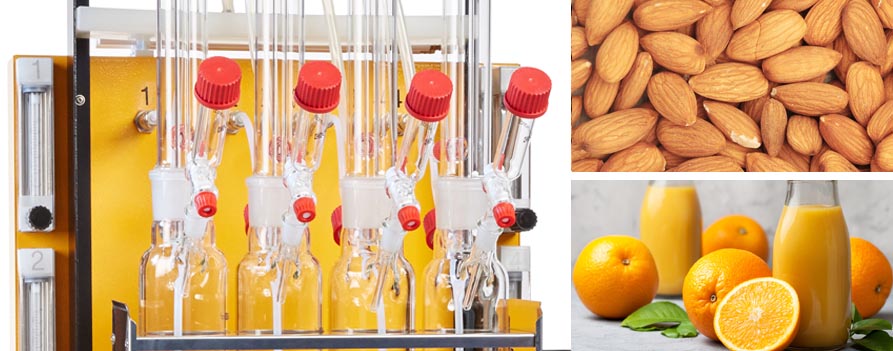
A threat to the food industry: Cyanide
Certain sorts of fruits contain cyanogenic glycosides. Natural sources can be the kernels and seeds of apricots, almonds, peaches and apples, as well as natural products such as cassava and bamboo shoots. Intact glycosides are harmless to humans, but can form toxic hydrogen cyanide during the processing and production of e.g. canned fruit or fruit juices. Therefore, government institutions regulate a certain limit for the content of cyanide in these products. Examples for these regulations are the A.I.J.N "Code of Practice for evaluation of Fruit and Vegetable Juices"1 for fruit juices or the EG 1334/2008 "Regulations on flavourings and certain food ingredients with flavouring properties for use in and on foods ..."2 for alcoholic beverages and stone fruit canned foods.
With the TT-CAR, C. Gerhardt offers a customized solution for the digestion and subsequent determination (volumetric or photometric) of the cyanide content in food with results compliant to the standards. With the corresponding application "Total Cyanide in water, soil and sludge" both the bound hydrocyanic acid and the free hydrocyanic acid can be determined. With the introduction of the new TURBOTHERM S, an improved version of this instrument will be available in the course of next year (2019). As already described, the following customers in the food sector are particularly interesting target groups:
- manufacturers of fruit juices
- producers of alcoholic beverages based on the mentioned fruits
- manufacturers of canned fruit
- almond processing companies
- marzipan manufacturers / manufacturer of sweets with almonds (e.g. amarettini)
In Germany, C. Gerhardt has already installed various instruments at renowned marzipan manufacturers, but there is still great international potential for the TT-CAR and its coming successor.
If you have any questions regarding the application, send an email to: application(at)gerhardt.de.
